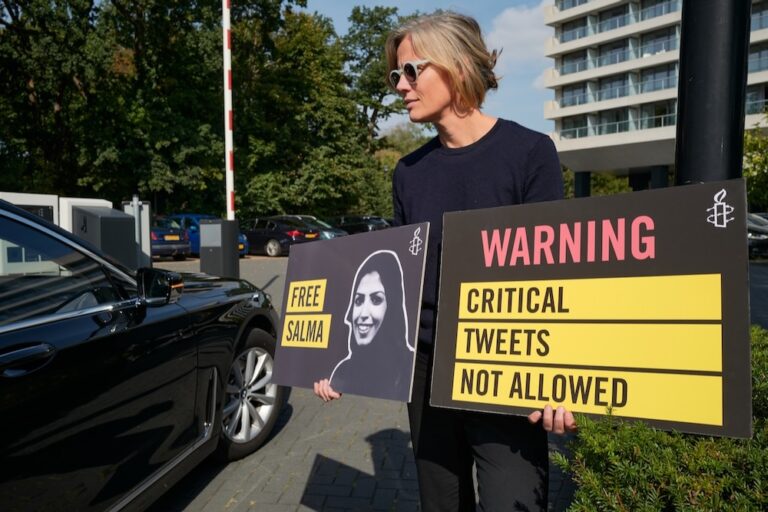(RSF/IFEX) – RSF has condemned the dismissal of the daily “Al-Watan”‘s editor-in-chief, Jamal Khashoggi, who learned from senior Saudi officials on 27 May 2003 that he was being fired. His removal comes after the newspaper ran several reports and editorials openly criticising the religious authorities, especially the mutawa (religious police). Khashoggi’s dismissal was “an arbitrary […]
(RSF/IFEX) – RSF has condemned the dismissal of the daily “Al-Watan”‘s editor-in-chief, Jamal Khashoggi, who learned from senior Saudi officials on 27 May 2003 that he was being fired. His removal comes after the newspaper ran several reports and editorials openly criticising the religious authorities, especially the mutawa (religious police).
Khashoggi’s dismissal was “an arbitrary and political decision,” RSF Secretary-General Robert Ménard said. One of the kingdom’s leading journalists, “Khashoggi is a victim of the bitter rivalry between reformist and ultra-conservative currents within the Saudi establishment,” he said.
Ménard said it was customary “in the kingdom of censorship” to promptly dismiss newspaper editors who stray too far beyond the limits set by the government, in order to send a reminder to all other journalists to keep practising self-censorship. “But if the royal family intends to keep its promises of reform, especially as regards political liberalisation, then the old methods are no longer appropriate,” Ménard added, urging the government to resist pressure from ultra-conservative religious leaders.
On 27 May, one such ultra-conservative leader, Abdullah bin Abdel Rahman al-Jabrein, accused “Al-Watan” of “mocking virtuous people in its articles and cartoons.” He claimed the newspaper had been “propagating evil and corruption” since it first appeared, and called on “pious believers” to boycott it.
Khashoggi’s appointment as “Al-Watan”‘s editor-in-chief had been confirmed by the Information Ministry in April. Under his stewardship, the newspaper had opened its columns to Saudi writers and intellectuals who support reforms, especially after the 12 May suicide attacks in Riyadh that left 34 dead and were blamed on Al-Qaeda.
Although privately financed, Saudi newspapers are closely monitored and the appointments of editors require government approval. Prince Nayef, the interior minister, again met with the editors of several Saudi newspapers during the week of 26 May to remind them of the guidelines to be followed and urge them not to publish reports likely to be “damaging and misleading.”
Khashoggi is the second “Al-Watan” editor-in-chief to be fired in a year. Qinan Al-Ghamdi, who was known for his incisive editorials, was forced to stand down from the same post on 7 May 2002. He had also called for political and religious reforms in his editorials.
Two months earlier, the editor in chief of the privately-owned daily “El Madina”, Mohamed Al-Mokhtar Al Fal, was fired at the interior minister’s behest after publishing a poem by Abdel Mohsen Mossalam on 10 March 2002 criticising corruption within the justice system (see IFEX alert of 25 March 2002).
Another journalist, Saleh Al-Harith, aged 34, has been in prison for three years for reporting on the persecution of the Ismaelites (a Shiite branch). A Shiite himself, Al-Harith was arrested in April 2000 in Najran and was sentenced to seven years’ imprisonment (see alert of 5 February 2003). He is currently being held in Dammam prison, in the east of the country. A reporter with the Saudi newspaper “Al-Yaum”, he had telephoned the pan-Arab television station Al-Jazeera on 23 April 2000 to report an attack by the security forces on the Al-Mansura mosque in Najran.


